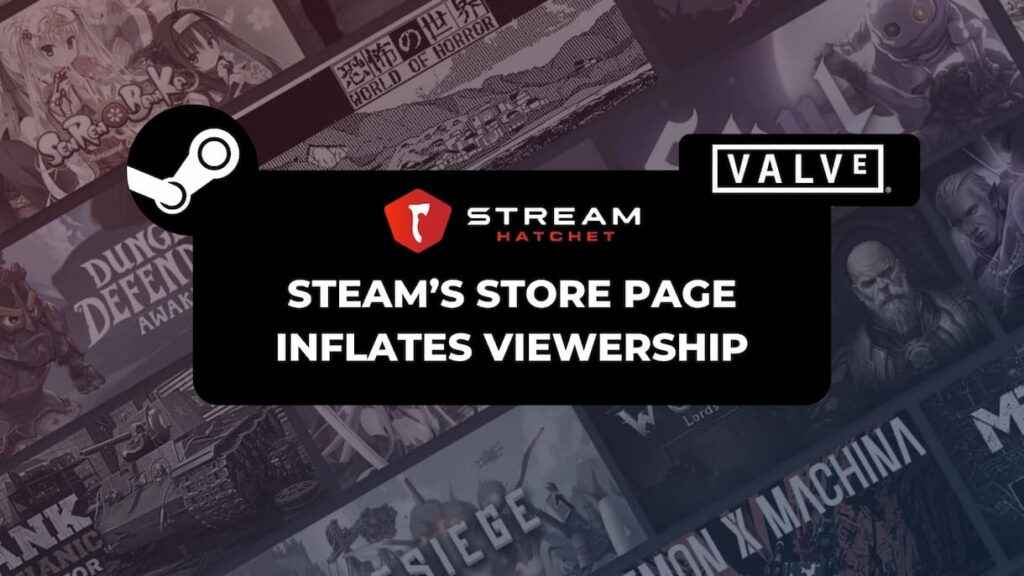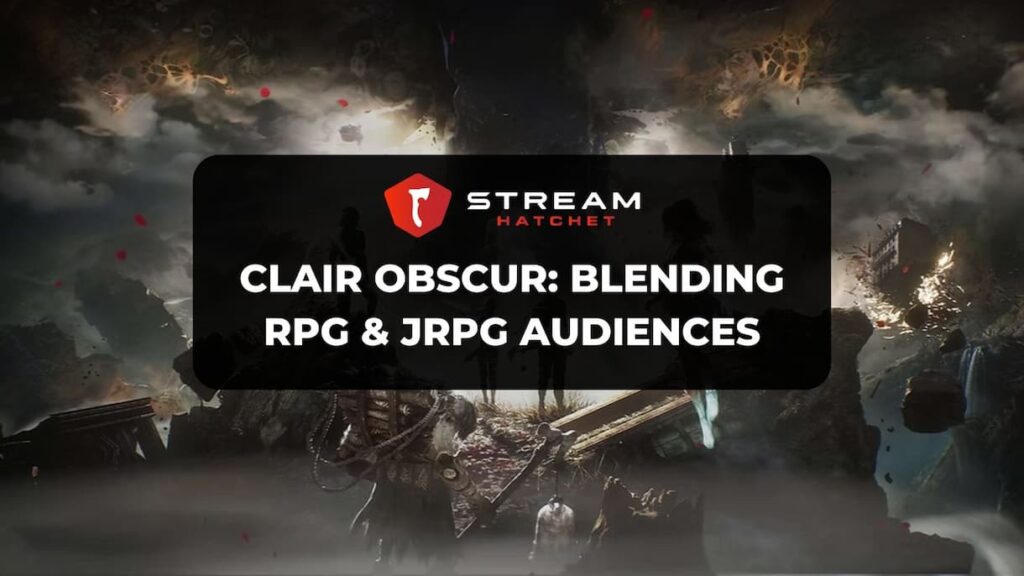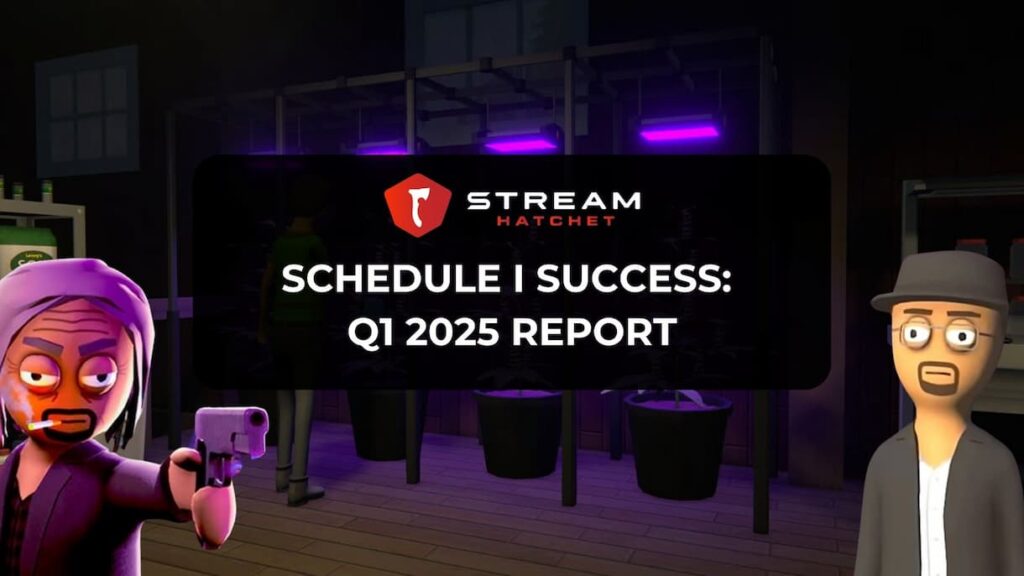When StarCraft was released back in 1998, its developer Blizzard had no idea that it would shape the online culture of an entire country. Blizzard intended the sci-fi real-time strategy (RTS) game to solidify their claim as the go-to RTS developer of the 90’s, but when the game made its way over to South Korea it quickly became a phenomenon that dwarfed the impact of their earlier Warcraft titles.
Since then, the South Korean esports scene has changed dramatically. The rise of streaming platforms brought the hardcore StarCraft scene to a worldwide audience. But following Twitch’s shutdown in South Korea on the 27th of February this year, a gap opened which created competition between Korean-based streaming platforms. AfreecaTV hopes to attract South Korean streamers with its prestige heritage, while disruptor Chzzk mimics Twitch’s UI to pull in the droves of users leaving the site.
As a cultural staple, StarCraft plays an important role in deciding which platform will succeed. It’s worth examining the legacy of StarCraft in South Korea and the current state of the game to see how Korean streaming is handling this paradigm shift.
A Brief History of StarCraft and Esports in South Korea
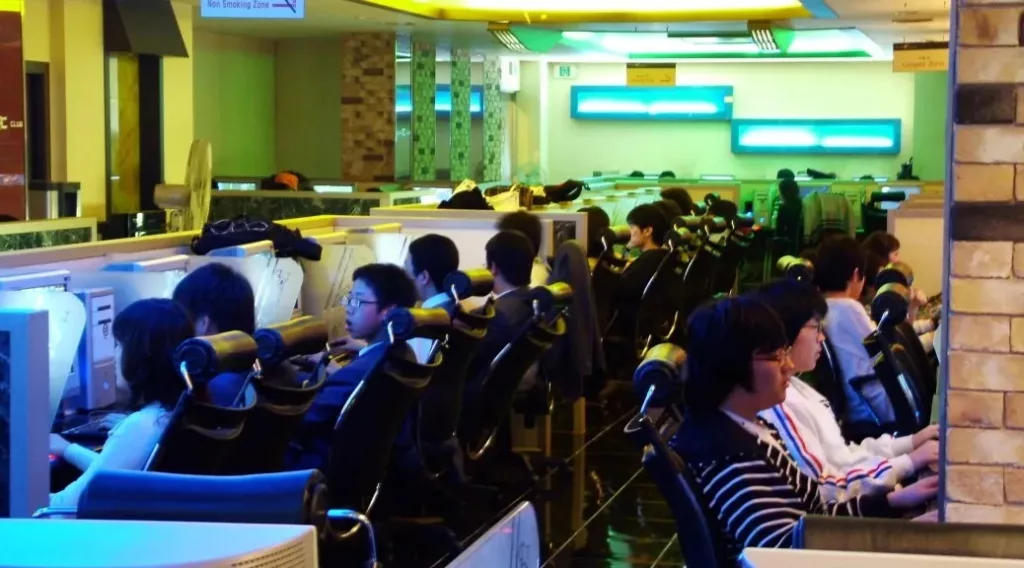
StarCraft’s success in South Korea stemmed from an unpredictable confluence of events. Throughout the mid-late 90’s, South Korea implemented radical changes to its digital infrastructure designed to improve the country’s internet speed, collectively known as the Korean Information Infrastructure (KII) project. As a result of the 1997 Asian financial crisis, many small business owners were forced to reinvest their money into businesses that could capitalize on the KII’s capabilities, turning their eye towards the then-niche prospect of “PC bangs” – stores with publicly available computers akin to an internet café.
In reality however, these PC bangs were more like gaming arcades: A place for teenagers to hang out between home and school. PC bang owners scrambled to find games that would hold people’s attention, a prospect made more difficult by the Korean ban on Japanese media which had been implemented in 1945. PC bang owners therefore turned to Western video games for content, one of which was StarCraft.

StarCraft’s widespread availability and the explosion of PC bangs fueled hype for the game, drawing the attention of TV network executives who were already familiar with airing competitive traditional games like Go. Soon, the best StarCraft players were not just sweating it out in PC bangs, but sweating under the studio lights of live competitive broadcasts. This was the seed of esports’ popularity – not just in South Korea, but around the world.
StarCraft’s Enduring Popularity on Streaming Platforms After 26 Years
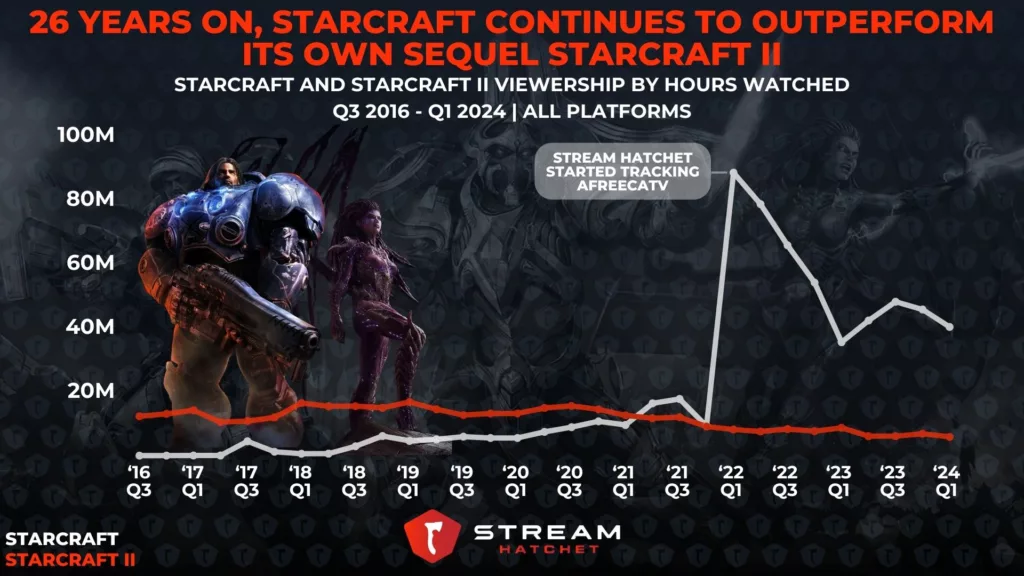
From these turbulent beginnings, StarCraft amassed a global following that endures even into 2024. In the first quarter of this year alone, StarCraft and StarCraft II amassed 46M hours watched. StarCraft is one of the rare examples of a gaming franchise where the first installment continuously outperforms its own sequel. While StarCraft II viewership has gradually declined, StarCraft viewership pulls in tens of millions of hours watched every month. It’s worth noting that the apparent spike in popularity in Q1 of 2022 may be misleading: This is simply when Stream Hatchet began tracking AfreecaTV’s viewing data. However, it’s most likely that, as with many other games, StarCraft gained popularity off the back of the COVID pandemic in 2020-2021.

The StarCraft scene is littered with famous streamers covering tournaments and constantly adapting to the latest meta. Over the last 12 months, by far the most popular streamer was 철구형2↑ (Cheol Gu-hyeong) with an average minute viewership (AMA) of 21K. Even more impressively, 철구형2↑ maintained this popularity over 549 hours of airtime, leading to 11.6M hours watched. Almost all of the top StarCraft streamers are on AfreecaTV, but rare exceptions like [ALTUBE] 김성현TV stream on YouTube instead (garnering an AMA of 6.8K himself).
Since its inception, personalities have been the key to a thriving StarCraft esports scene. Pro esports players became like minor celebrities, with fans tuning in to see their favorite players face off in fierce rivalries. As one example, Lee “FlaSh” Young-ho is often considered the GOAT of competitive StarCraft, having shaken up the meta by opting to choose a random faction at the beginning of each game to throw off his opponent’s planning. This stunt required intimate knowledge of the game, bringing the crowd to their feet with the sheer boldness of the strategy. This player-first mentality presaged the personality-centric streaming culture of today, such as the rise of co-streaming popularity in esports coverage.
AfreecaTV Remains the Dominant Platform for StarCraft Streams
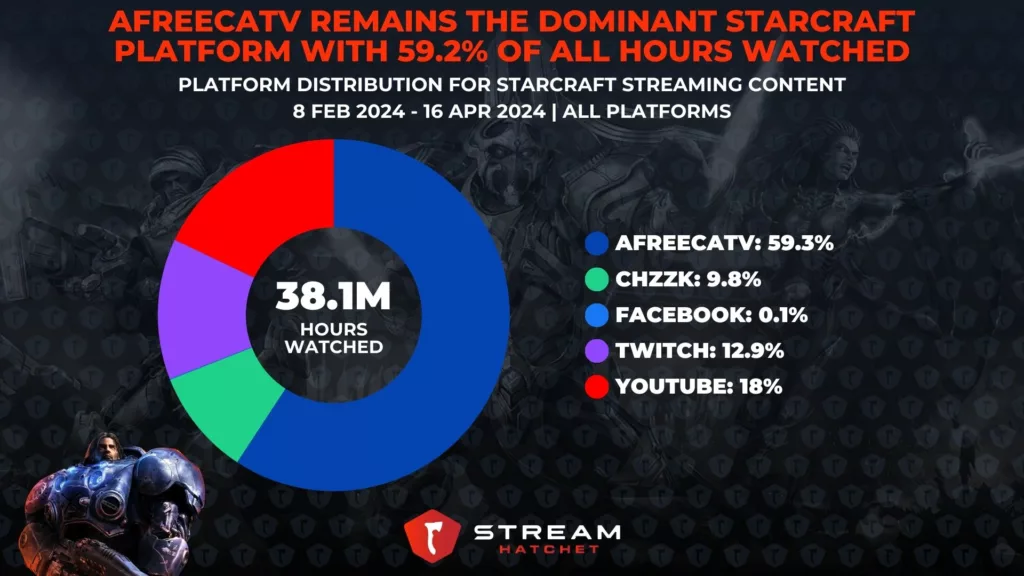
Looking at the last 10 weeks alone, AfreecaTV remains the most popular platform for watching StarCraft content with 59.2% of all hours watched. Chzzk has been active for all of this period, having launched back on the 19th of December, yet it only accounts for 9.8% of all hours watched – less even than Twitch which had been shut down for most of this time with 12.9%. Much of the Twitch viewership comes from English-speaking fans and players who are still actively engaged in the game.
It’s clear that as far as Korean streaming is concerned, AfreecaTV holds a special place in the StarCraft community’s heart as the game’s original streaming platform since the early days of esports. The only game with more hours watched than StarCraft on AfreecaTV is, unsurprisingly, League of Legends. On Chzzk, however, StarCraft sits far below other mainstream Twitch-typical games such as GTA V and Fortnite.
StarCraft Esports Has Been a Staple of Korean Pro Gaming Since 2000

Over the last 12 months, StarCraft II has been the most watched version of the game for esports coverage. Held in February, the 2024 IEM Katowice garnered 1.1M hours watched with 30.2% of its viewership coming from co-streaming. In fact, of the 236 events tracked in the last 12 months, just over one quarter of all viewership came from co-streaming. Meanwhile, Europe seems to have a thriving competitive StarCraft scene, with the ESL SC2 Masters 2023 Winter event pulling in the most hours watched for the Masters series with 755K hours watched.
As the originator of esports in South Korea, it’s impressive that the original StarCraft still remains popular on the scene to this day. When the Korean Ministry of Culture founded the “Korean eSports Association” (KeSPA) back in 2000, the intent was to legitimize esports as a skill on par with other competitive sports. In 2002, “pro gamer” became an official job title which inspired a new generation of kids to pursue the occupation. South Korea was far ahead of its time in embracing competitive video gaming, a decision that would not have been possible without the overwhelming demand for StarCraft.
StarCraft Stands as the King of RTS Games on Streaming
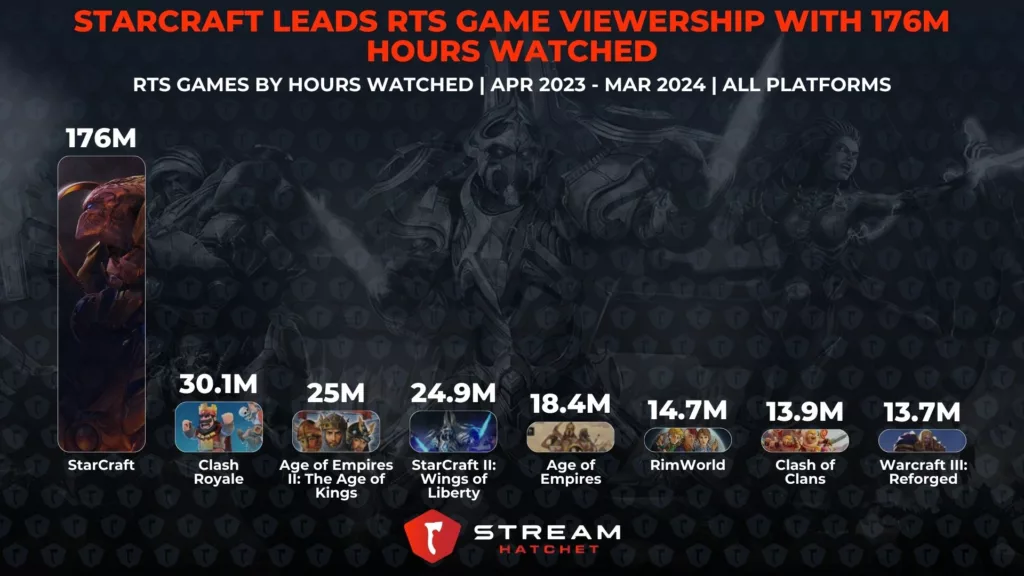
When comparing StarCraft’s popularity on streaming to other RTS games, it’s not even close. StarCraft pulled in 176M hours watched over the past 12 months – 145M more hours watched than the second most popular title, Clash Royale, with 31M hours watched. The RTS genre experienced the height of its popularity in the late 90’s with a slew of titles such as the original Age of Empires and Command & Conquer. Although these games still enjoy a hardcore competitive fanbase, it’s rare for them to perform on par with MOBA and Battle Royale games in the contemporary streaming arena.
StarCraft’s ability to buck this trend speaks to the special place it has in the hearts of gamers, not just in South Korea but worldwide. This game isn’t prized for its mind-blowing graphics or highly polished gameplay. Instead, StarCraft fans love the bugs and intricacies of the original game, having crafted strategies over two decades to abuse the original title’s errors. This legacy is something that few RTS titles have the pedigree to live up to.
For now, StarCraft remains as strong as ever. Fans remain loyal, not just to the game but to AfreecaTV: The platform that elevated the first pro South Korean players to stardom. It remains to be seen if Chzzk, as it continues to grow in popularity, can dethrone AfreecaTV and win over the hearts of top StarCraft players. Stream Hatchet will continue to monitor the South Korean streaming space as the situation evolves.
To discover more about cornerstone games and new platforms in the streaming space, follow Stream Hatchet:

